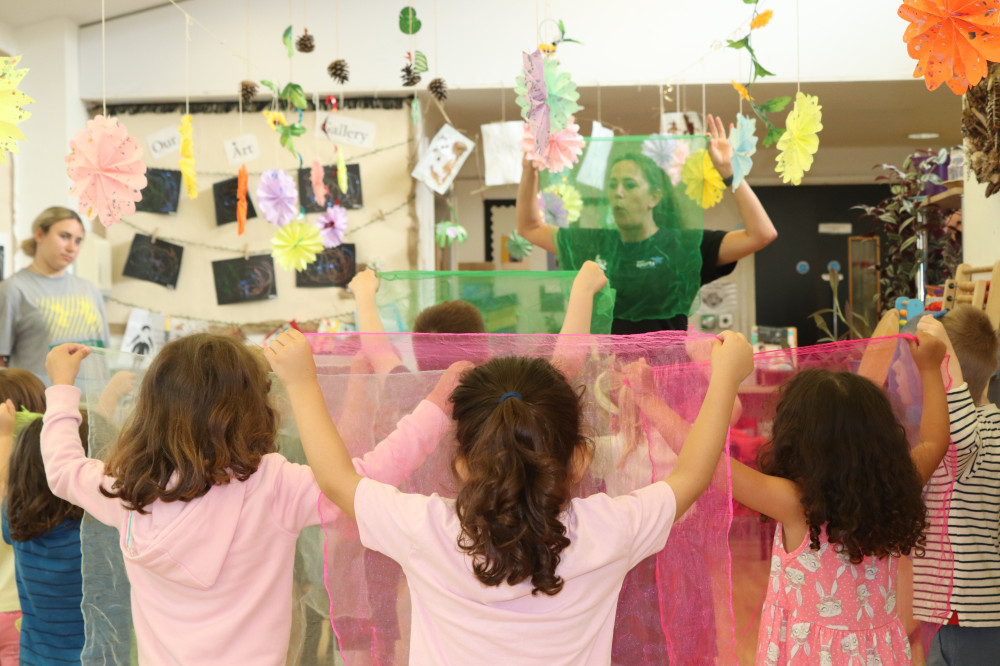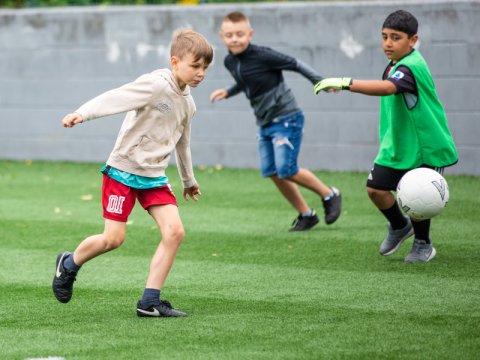CPD Courses
Get the training you need to develop and deliver early childhood activities.
Find Out More

Welcome to the Early Years section of the Herts Sport & Physical Activity Partnership website.
We've developed this page in response to The National Early Years Survey in 2022, in which settings in Hertfordshire told us they would like additional support in delivering physical activity.
Here, you will find a host of suitable activities, FREE resources and FREE training opportunities to support your delivery of physical activity in your Early Years settings.
Click HERE to access our Herts Mini Movers resource
Physical Activity Policy for Under 5s
Establishing clear physical activity policies and providing staff with appropriate training are essential for promoting higher levels of physical activity in early years settings. Policies offer a structured framework and accountability to ensure consistent practice, while professional development training equips practitioners with the knowledge and skills needed to support children’s physical literacy and movement skill development.
Securing a policy in place will provide educators with more confidence and security to engage in heavy movement play.
Helen Battelley, the Movement Consultant for Herts Mini Movers has created and developed a Physical Activity Policy specifically for young children. Please embed this policy into your practice and provision to prioritise childrens movement play. Click HERE to access this policy.
This guidance is for early years providers in England who are caring for early years children aged 0 to 5 years. From September 2025, the EYFS statutory framework will include a safeguarding and welfare requirement that asks providers to follow this nutrition guidance unless there is good reason not to:
Early Years Foundation Stage nutrition - GOV.UK
All children including babies and young children have the right to the best possible health and development as set out in the United Nations Convention on the Rights of the Child (UNCRC).
Movement matters in early childhood and is critical for the future health and development of all children. Movement begins from birth, and is their first form of communication as they begin to explore the world around them. Movement play and physical activity lay the foundations for all movement patterns and skills we need throughout our life. It is vital during this time that children have the FREEDOM and SPACE to move without restrictions.
We only need to stop and observe young children to see how movement is embedded within the very core of all early childhood development. The development of the vestibular system as baby turns in utero, the manipulation of the body for childbirth, the urge to explore the world in early infanthood, all demonstrate the power of innate movement. Yet across the globe we are seeing a decline in children’s physical activity and subsequent levels of physical development.
Helen Battelley, a researcher, lecturer, and consultant in early childhood physical development has seen the deleterious effects this developmental delay has on other areas of learning and the impact may linger for years.
Every child has the right to rest, relax, play and take part in cultural and creative activities as set out in the United Nations Convention on the Rights of the Child (UNCRC).
Early Childhood Physical Activity should be taken seriously and given the priority it warrants, the UNESCO convention on the rights of the child highlight such value in 3 articles.
Article 31
1. States Parties recognise the right of the child to rest and leisure, to engage in play and recreational activities appropriate to the age of the child and to participate freely in cultural life and the arts.
2. States Parties shall respect and promote the right of the child to participate fully in cultural and artistic life and shall encourage the provision of appropriate and equal opportunities for cultural, artistic, recreational and leisure activity.
Article 29
1. States Parties agree that the education of the child shall be directed to:
(a) The development of the child’s personality, talents and mental and physical abilities to their fullest potential;
Article 27
1. States Parties recognize the right of every child to a standard of living adequate for the child’s physical, mental, spiritual, moral and social development.
We all have a role to play in supporting young children’s physical health.
Without experience, exposure, and developing mastery (learning and embedding physical skills) in the earliest of years, children’s movement potential, muscle tone, stamina, and elasticity may disengage the body and mind’s ability to engage in physical activity.
In 2019 the Chief Medical Officer (CMO) set out the recommended levels of physical activity for 0-5 years:
• Infants should be physically active several times every day in a variety of ways, including interactive floor-based activity, e.g. crawling.
• For infants not yet mobile, this includes at least 30 minutes of tummy time spread throughout the day while awake (and other movements such as reaching and grasping, pushing and pulling themselves independently, or rolling over); more is better.
• Toddlers should spend at least 180 minutes (3 hours) per day in a variety of physical activities at any intensity, including active and outdoor play, spread throughout the day; more is better.
• Pre-schoolers should spend at least 180 minutes (3 hours) per day in a variety of physical activities spread throughout the day, including active and outdoor play. More is better; the 180 minutes should include at least 60 minutes of moderate-to-vigorous intensity physical activity.
Get the training you need to develop and deliver early childhood activities.
Find Out More
Resources to support the delivery activities in the Early Years.
https://sportinherts.org.uk/resources-75-educational-setting-early-years

If you have a question about Early Years, please email: earlyyears@herts.ac.uk